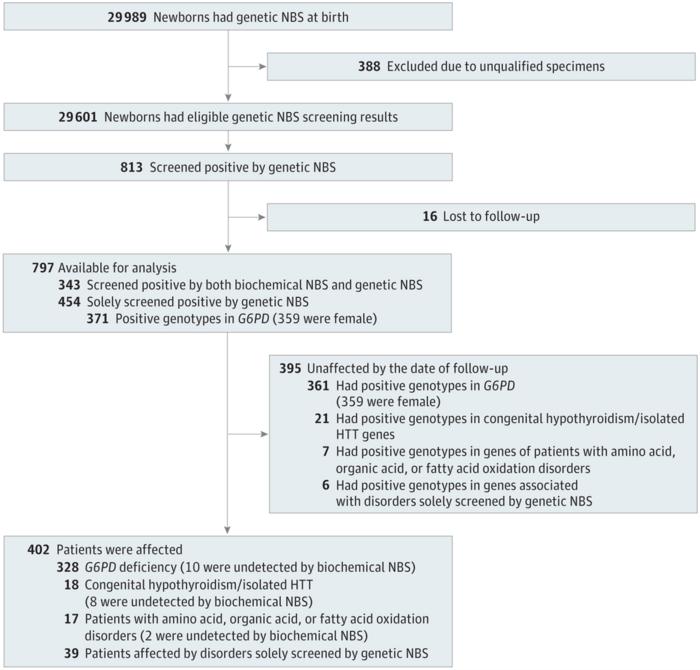Newborn screening (NBS) is routinely performed across the world using biochemical testing methods. Recent advancements in genetic sequencing are a potential game-changer for newborn screening, swiftly assessing a comprehensive range of monogenic disorders. Yet, the effectiveness of genetic sequencing as an alternative method for NBS has not previously been studied.

Credit: BGI Genomics
Newborn screening (NBS) is routinely performed across the world using biochemical testing methods. Recent advancements in genetic sequencing are a potential game-changer for newborn screening, swiftly assessing a comprehensive range of monogenic disorders. Yet, the effectiveness of genetic sequencing as an alternative method for NBS has not previously been studied.
To evaluate the outcomes of applying gene panel sequencing as a first-tier newborn screening test, a recent study conducted by eight NBS centers and BGI Genomics was published in JAMA Network Open.
These results – from this pioneering study that incorporates gene panel sequencing into NBS as a concurrent first-tier screening strategy in a large population scale – indicate that approximately one out of every 500 newborns benefited from the integration of gene panels as a first-tier screening test.
Method and Findings:
Researchers aimed to evaluate the ability of genetic sequencing methods to detect monogenic disorders in newborns. This prospective cohort study included 29,601 newborns recruited from eight newborn screening centers in China between February 21 and December 31, 2021. Neonates with positive results were followed up before July 5, 2022.
The screen consisted of biochemical screening tests and a targeted gene panel sequencing test for 128 conditions. The biochemical and genomic tests could both detect 43 of the conditions, whereas the other 85 conditions were screened solely by the gene panel.
Key findings include:
1. Via genetic sequencing, 813 infants screened positive (2.7%; 95% CI, 2.6%-2.9%), with 402 of these resulting in a diagnosis, which is a positive predictive value of 50.4% (95% CI, 50.0%-53.9%).
2. The gene panel sequencing identified 59 patients undetected by biochemical tests, including 20 patients affected by biochemically and genetically screened disorders and 39 patients affected by solely genetically screened disorders, which translates into one out of every 500 newborns (95% CI, 1/385-1/625).
3. A total of 445 newborns were diagnosed with 13 disorders screened by both genetic and biochemical NBS, which included G6PD deficiency (328 newborns), congenital hypothyroidism and isolated HTT (94 newborns), and amino acid, organic acid, or fatty acid oxidation disorders (23 newborns). While 82 of these patients were undetected by genetic NBS (and detected by biochemical NBS), it was notable that 20 of these patients were detected by genetic NBS (while undetected by biochemical NBS).
4. A total of 328 patients with G6PD deficiency (282 male and 46 female) were identified. All were detected by genetic NBS, but 10 male patients were not detected by biochemical NBS; instead, they were confirmed in the confirmatory tests. Overall, the fluorometric assay had a sensitivity of 96.95% (95% CI, 94.48%-98.33%) and a specificity of 99.71% (95% CI, 99.64%-99.77%), whereas genetic NBS had a sensitivity of 100% (95% CI, 98.84%-100%) and a specificity of 98.61% (95% CI, 98.46%-98.75%) for G6PD deficiency.
Leveraging Genetic Sequencing for NBS
This study presents the outcomes of genetic NBS as a first-tier screening test in clinical settings, which is of great importance to clinicians, geneticists, and families for better health care and counseling.
For example, a benefit of incorporating genetic with biochemical NBS is to reduce the number of false positives. This study’s data demonstrate that the positive predictive value (PPV) of genetic NBS is significantly higher than that of biochemical NBS, except for the fluorometric assay for G6PD in female newborns. The difference was highly apparent for amino acid, organic acid, and fatty acid oxidation disorders (70.83% by genetic NBS vs 5.29% by tandem mass spectrometry; P < .001), which is in line with previous studies. Reducing the number of false positives would, in turn, relieve the stress and anxiety of parents and decrease the number of follow-ups.
The research team acknowledged that further studies and collaborations are needed to validate these findings across populations and health care systems worldwide, which will lead to the refinement and optimization of newborn screening protocols.
This project follows relevant regulations related to biological and medical research and has been approved by the Ethics Committee of eight newborn screening centers and BGI Genomics.
About BGI Genomics:
BGI Genomics, headquartered in Shenzhen, China, is the world’s leading integrated solutions provider of precision medicine. Our services cover more than 100 countries and regions, involving more than 2,300 medical institutions. In July of 2017, as a subsidiary of BGI Group, BGI Genomics (300676.SZ) was officially listed on the Shenzhen Stock Exchange.
Journal
JAMA Network Open
DOI
10.1001/jamanetworkopen.2023.31162
Method of Research
Observational study
Subject of Research
People
Article Title
Genomic Sequencing as a First-Tier Screening Test and Outcomes of Newborn Screening
Article Publication Date
1-Sep-2023
COI Statement
None




